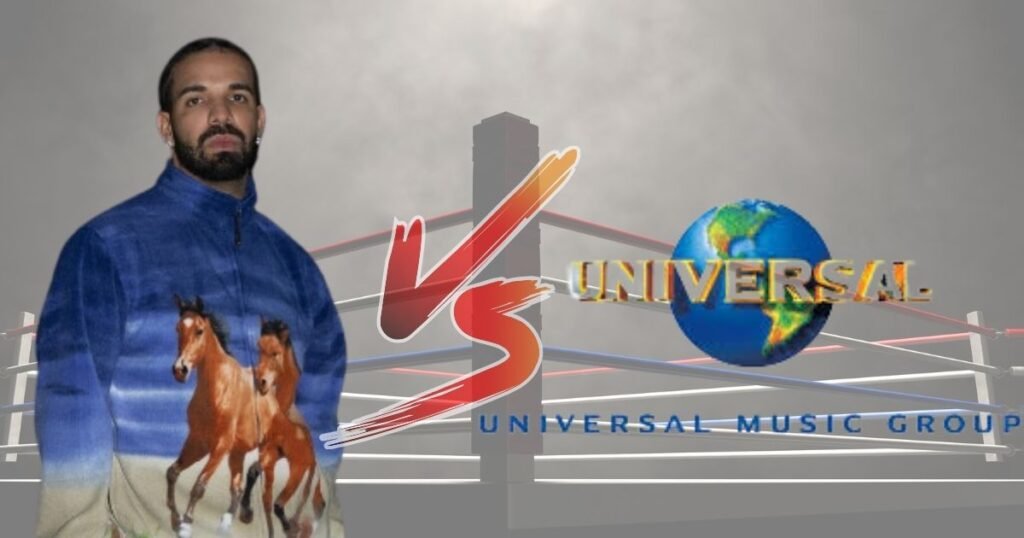In the ever-evolving landscape of the music industry, few rivalries capture headlines quite like the one between Drake and Universal Music Group (UMG). Recently, Drake has escalated the tension by filing a second legal action against UMG, this time accusing the music giant of defamation related to Kendrick Lamar’s song “Not Like Us.” This decision heightens the personal and professional tension between two major hip-hop figures while also prompting important discussions about ethics and practices in the music industry. Let’s delve deep into the intricacies of this high-stakes battle, exploring the allegations, the relationships involved, and the broader implications for the industry.
Drake’s Legal Battle with Universal Music Group (UMG)

In a dramatic turn of events, global music superstar Drake has launched a second legal offensive against Universal Music Group (UMG), one of the most influential entities in the music industry. This latest legal action is a follow-up to his initial lawsuit filed in New York, which accused UMG of defaming him through Kendrick Lamar’s song “Not Like Us.” The escalating tension between Drake and UMG, coupled with the involvement of Kendrick Lamar, has ignited widespread media attention and industry speculation.
Overview of Drake’s Allegations
At the core of Drake’s allegations is the claim that UMG knowingly released and promoted Kendrick Lamar’s track “Not Like Us,” which Drake asserts contains false and damaging statements about his character. According to Drake, the song paints him as a “certified pedophile” and a “predator,” accusations that are not only baseless but also severely detrimental to his personal and professional reputation.
Drake’s legal team contends that UMG was fully aware of the defamatory nature of the song and proceeded with its release and promotion to tarnish Drake’s image deliberately. This move, they argue, was not merely an oversight but a calculated effort to undermine Drake’s standing in the music industry and among his fanbase.
The Role of Kendrick Lamar’s Song
Kendrick Lamar, an artist renowned for his lyrical prowess and critical acclaim, finds himself inadvertently at the center of this controversy. While Lamar has not been directly implicated in Drake’s legal filings, the song “Not Like Us” has become the focal point of the dispute. Drake alleges that the song’s lyrics, along with its accompanying album art and music video, were intentionally crafted to attack his character and career.
The conflict between Drake and Lamar, previously marked by competitive exchanges and lyrical diss tracks, has now taken a legal dimension. This evolution from verbal sparring to courtroom battles signifies the depth of animosity and the high stakes involved for both parties.
Details of Drake’s Claims
Accusations of Defamation and Harm
Drake’s lawsuit against UMG centers on the accusation of defamation. Defamation, in legal terms, involves the communication of false statements that harm another person’s reputation. Drake alleges that UMG facilitated the dissemination of defamatory content through Kendrick Lamar’s song, thereby causing significant harm to his public image and career.
The legal filings assert that UMG knew about the false claims embedded within “Not Like Us” and yet chose to proceed with its release and promotion. Drake’s team argues that this negligence, or worse, intentional act, resulted in widespread misinformation and tarnished Drake’s reputation both within the industry and among the general public.
The impact of such allegations is profound. Reputation is a critical asset in the music industry, where public perception directly influences an artist’s success, opportunities, and longevity. Defamation of this nature can lead to loss of endorsements, strained professional relationships, and a decline in fan support, all of which can have long-term detrimental effects on an artist’s career.
Alleged “Pay-to-Play Scheme” by UMG
In addition to defamation, Drake has leveled accusations of a “pay-to-play” scheme against UMG. According to the lawsuit, UMG engaged in a practice where payments were funneled to iHeartRadio, a major radio broadcasting company, to ensure the heavy rotation of Kendrick Lamar’s song on radio platforms.
This alleged scheme, Drake claims, was orchestrated to artificially inflate the song’s popularity and visibility, thereby making it a viral hit at his expense. By securing prime placement and extensive airplay for “Not Like Us,” UMG allegedly aimed to maximize the song’s reach and impact, ensuring that Drake’s supposed transgressions were widely disseminated.
Such practices, if proven, not only undermine the integrity of music promotion but also violate fair competition principles. The manipulation of radio play to favor certain narratives or artists can distort the market, giving undue advantage to specific tracks or artists while disadvantaging others. This, in turn, can stifle artistic diversity and authenticity, which are cornerstones of the music industry.
Background of Drake and UMG’s Relationship
A Longstanding Partnership Turned Sour
Drake’s relationship with Universal Music Group has been a significant aspect of his career. Drake began his career under Lil Wayne’s Young Money label, distributed by Republic Records, before eventually forming a direct partnership with Republic, part of UMG.. This collaboration has been instrumental in catapulting Drake to global stardom, with UMG providing the necessary support, distribution, and promotional infrastructure to sustain his success.
However, the once-strong partnership between Drake and UMG has recently soured. The current legal battle marks a stark departure from their previous alliance, highlighting deep-seated conflicts and differing visions for Drake’s career trajectory. The nature of their fallout remains a subject of speculation, but the legal actions suggest significant grievances that have eroded the trust and cooperation that once defined their relationship.
The breakdown of this partnership is particularly notable given Drake’s long-standing association with UMG, which has been a cornerstone of his career. The implications of this rift extend beyond personal disputes, potentially affecting future collaborations, distribution deals, and Drake’s standing within the industry.
UMG’s Defense Against the Claims
In response to Drake’s allegations, Universal Music Group has vehemently denied any wrongdoing. UMG’s official statement emphasizes its commitment to ethical practices and dismisses the claims as “offensive and untrue.” They assert that their marketing and promotional campaigns are conducted with the highest ethical standards, refuting any suggestion that they would engage in activities aimed at undermining their artists.
UMG’s defense underscores their position that fans ultimately choose the music they want to hear, and no amount of promotional tactics can alter consumer preferences in a meaningful way. By highlighting their adherence to ethical standards, UMG seeks to distance themselves from the accusations of defamation and unfair promotional practices, framing the legal actions as baseless and unfounded.
This defensive stance is crucial for UMG, given their stature in the music industry. A reputation for ethical conduct is essential for maintaining trust among artists, partners, and consumers. Any perception of misconduct could have far-reaching consequences, affecting their relationships with current and prospective clients.
Kendrick Lamar’s “Not Like Us” and the Controversy
Analysis of the Song’s Lyrics
“Not Like Us” by Kendrick Lamar is the central piece in this legal dispute. While the song itself has not been released or publicly scrutinized, the allegations suggest that its content includes false and damaging statements about Drake. The lyrics, as described by Drake’s legal team, allegedly label him as a “certified pedophile” and a “predator,” accusations that are not only unfounded but also deeply defamatory.
The power of lyrics in hip-hop cannot be overstated. Artists often use their music to express personal grievances, engage in rivalries, and comment on social issues. However, when lyrics cross the line into defamatory territory, they can lead to serious legal consequences. The balance between artistic expression and defamation is a delicate one, and in this case, Drake argues that Kendrick Lamar’s song has overstepped that boundary.
Without access to the actual lyrics, it’s challenging to assess the validity of Drake’s claims fully. However, the mere accusation that a song contains defamatory content is serious and warrants thorough legal examination. The context in which these lyrics were written and their intended message are crucial factors that will likely be scrutinized in court.
Drake’s Reputation
Reputation is everything in the music industry. An artist’s public image directly influences their fan base, commercial opportunities, and overall career trajectory. Drake, being one of the most prominent figures in hip-hop, understands the importance of maintaining a positive and influential persona.
The allegations embedded within “Not Like Us,” if true, have the potential to cause significant harm to Drake’s reputation. Accusations of being a “certified pedophile” and a “predator” are not only false but also carry severe social stigma. Such defamatory statements can lead to a loss of fan trust, decreased concert attendance, and diminished sales of music and merchandise.
Moreover, the psychological impact of having one’s character malignly attacked in a widely distributed song should not be underestimated. For Drake, these accusations extend beyond mere professional setbacks; they represent a personal affront that could have lasting emotional repercussions.
The broader public’s perception of Drake could be irrevocably altered if these allegations gain traction, regardless of their veracity. This is why Drake’s legal team is taking such aggressive action against UMG, aiming to mitigate the damage and restore his reputation.
Legal Implications and Industry Repercussions
The Pre-Action Filings Explained
Drake’s legal strategy involves filing pre-action petitions rather than immediate lawsuits. Pre-action filings are a preliminary step in the legal process, allowing plaintiffs to gather necessary information and evidence before formally initiating a lawsuit. In this context, Drake’s legal team seeks to depose key figures at UMG and iHeartRadio to build a robust case supporting their allegations.
This approach serves multiple purposes. Firstly, it provides Drake’s team with a clearer understanding of the extent of UMG’s involvement in promoting “Not Like Us.” Secondly, it allows for the collection of evidence that can substantiate claims of defamation, civil fraud, and racketeering should the case proceed to trial.
By initiating pre-action filings, Drake is laying the groundwork for a potential full-fledged lawsuit, ensuring that his legal team is well-prepared with the necessary information to advance their claims effectively.
Potential Lawsuits and Future Outcomes
Depending on the findings from the pre-action filings, Drake may decide to escalate the legal battle by filing formal lawsuits against UMG. The potential charges could include defamation, civil fraud, and racketeering—each carrying its own set of legal consequences.
A defamation lawsuit would require Drake to prove that UMG knowingly disseminated false statements that harmed his reputation. Civil fraud claims would focus on deceptive practices aimed at manipulating the market or unfairly disadvantaging Drake. Racketeering, a more severe charge, involves engaging in organized illegal activities, suggesting a pattern of misconduct by UMG.
The outcomes of these potential lawsuits are uncertain and will hinge on the evidence presented and the legal arguments made by both sides. A successful lawsuit could result in significant financial damages awarded to Drake, as well as a public vindication of his claims. Conversely, if UMG can effectively defend against the allegations, it could reinforce their reputation and potentially discourage similar future claims.
Regardless of the outcome, this legal battle is poised to set important precedents regarding the responsibilities and ethical obligations of music labels in promoting and distributing content that involves their artists.
Drake vs. UMG: A Broader Industry Perspective
Ethical Practices in Music Promotion
The dispute between Drake and UMG shines a spotlight on the ethical practices within music promotion and distribution. Central to this issue is the responsibility of music labels to act in the best interests of their artists, ensuring that content released under their banner does not unjustly harm an artist’s reputation.
If UMG is found to have knowingly promoted defamatory content, it would raise serious ethical concerns about its role in artist relations and content management. Music labels wield significant power in shaping an artist’s public image and career trajectory, making their ethical conduct paramount.
This case prompts a broader conversation about the need for transparency and accountability in the music industry. Ensuring that artists are protected from defamatory content and that promotional practices are fair and honest is essential for maintaining trust and integrity within the industry.
Viral Marketing in Artist Rivalries
Viral marketing has become a staple in the modern music industry, often used to amplify artist rivalries and generate buzz around releases. While this strategy can be effective in boosting visibility and engagement, it also carries the risk of crossing ethical boundaries.
In the case of Drake and Kendrick Lamar, the use of viral marketing to escalate their feud into legal battles highlights the potential pitfalls of such strategies. When marketing tactics are employed to deliberately tarnish an artist’s reputation or manipulate public perception, it not only damages individual careers but also undermines the overall credibility of the industry.
This scenario underscores the importance of balancing promotional strategies with ethical considerations. Music labels must navigate the fine line between generating interest and respecting the reputations and well-being of their artists.
READ MORE ON ENTERVYN: From Compton to Glory: Kendrick Lamar’s GNX Speaks Volumes
Conclusion and the Road Ahead for Drake
Drake’s legal confrontation with Universal Music Group represents a pivotal moment in the music industry, intertwining personal grievances with corporate accountability. The allegations of defamation and unethical promotional practices raise critical questions about the responsibilities of music labels in safeguarding their artists’ reputations and ensuring fair competition.
As this legal battle unfolds, its implications extend beyond the immediate conflict between Drake and UMG. It serves as a case study for the broader industry, highlighting the need for clear ethical guidelines and transparent practices in music promotion and distribution. The outcome of this dispute could set significant precedents, influencing how similar conflicts are handled in the future and potentially reshaping the dynamics between artists and their labels.
For Drake, the path forward involves not only navigating the legal challenges but also managing the public perception and maintaining his artistic integrity. Success in this battle could reinforce his standing as a resilient and principled artist, while a loss might compel him to reevaluate his alliances and strategies within the industry.
Ultimately, this high-profile legal battle underscores the complex interplay between artistry, reputation, and corporate interests in the music world. As the case progresses, all eyes will remain on how it shapes the future landscape of music promotion and artist-label relationships.
FAQs
- What is Drake accusing UMG of doing?
Drake alleges that Universal Music Group (UMG) knowingly released and promoted Kendrick Lamar’s song “Not Like Us,” which contains false and defamatory statements about him. He claims that UMG engaged in a “pay-to-play” scheme by funnelling payments to iHeartRadio to ensure the song’s heavy rotation, thereby damaging his reputation and career. - How did Kendrick Lamar’s song spark the controversy?
Kendrick Lamar’s song “Not Like Us” is at the center of the controversy because Drake claims it includes defamatory lyrics that falsely accuse him of being a “certified pedophile” and a “predator.” Drake argues that the song was intentionally promoted by UMG to harm his reputation, leading to the current legal battle. - What is a pre-action filing in legal terms?
A pre-action filing is a preliminary legal step taken before formally initiating a lawsuit. It allows the plaintiff to gather essential information and evidence through depositions and inquiries. In Drake’s case, the pre-action filing aims to obtain statements from key figures at UMG and iHeartRadio to support his potential defamation and fraud claims. - How has UMG responded to Drake’s claims?
Universal Music Group has strongly denied Drake’s allegations, labeling them as “offensive and untrue.” UMG emphasized its commitment to ethical marketing and promotional practices, asserting that they do not engage in actions designed to undermine its artists. They maintain that fans choose the music they want to hear, regardless of promotional efforts. - What are the potential outcomes of this legal battle?
The potential outcomes of this legal battle include Drake successfully proving defamation and fraud, which could result in significant financial damages awarded to him and a public vindication of his claims. Alternatively, if UMG successfully defends against the allegations, it could reinforce its reputation and potentially deter similar future claims. The case may also set important legal precedents regarding the responsibilities of music labels in promoting and distributing content.





